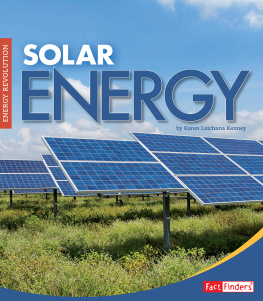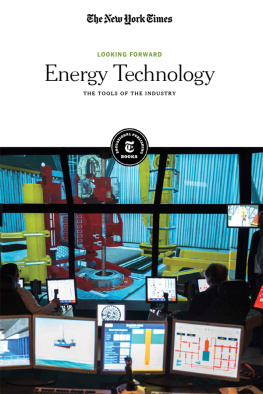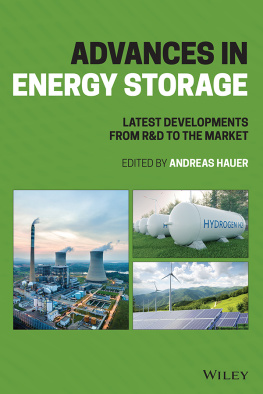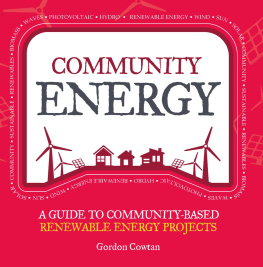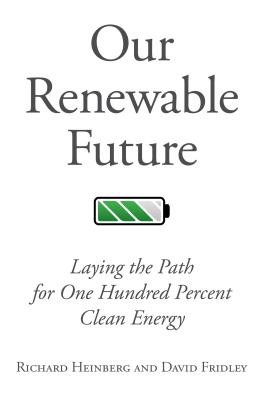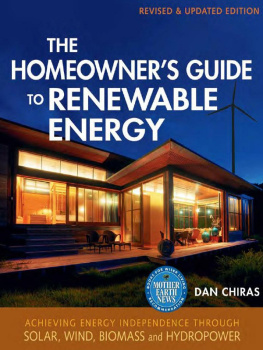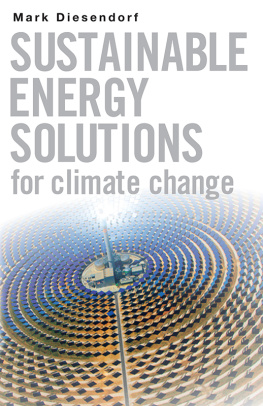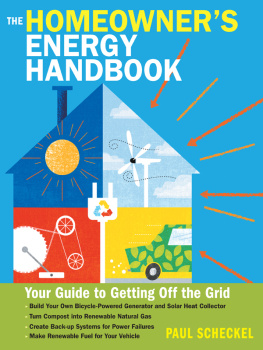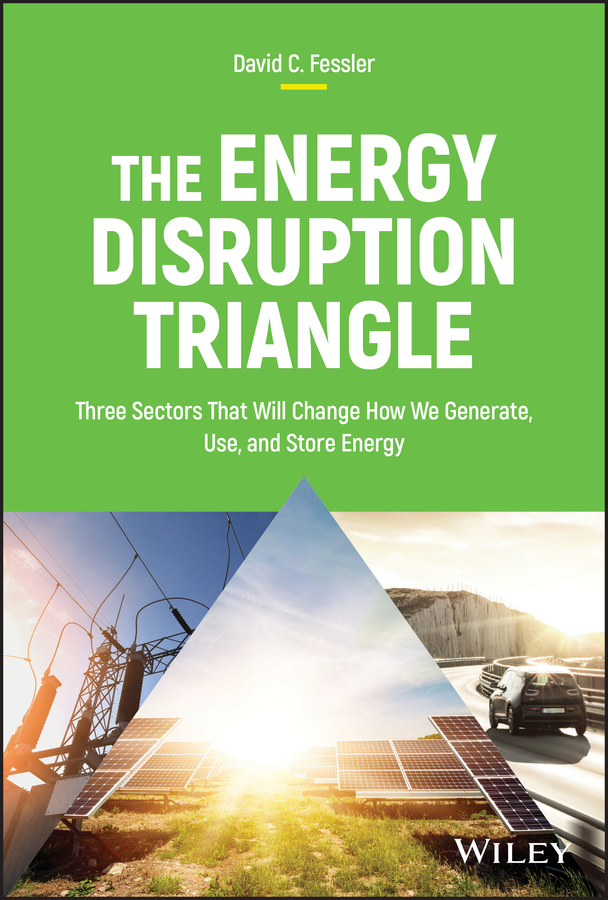
Table of Contents
List of Illustrations
- Chapter 1
- Chapter 2
- Chapter 3
- Chapter 4
- Chapter 5
- Chapter 6
- Chapter 7
- Chapter 8
- Chapter 9
- Chapter 10
- Chapter 12
- Chapter 13
- Chapter 15
- Chapter 16
- Chapter 18
Guide
Pages
The Energy Disruption Triangle
Three Sectors That Will Change How We Generate, Use, and Store Energy
David C. Fessler

Copyright 2019 by John Wiley & Sons, Inc. All rights reserved
Published by John Wiley & Sons, Inc., Hoboken, New Jersey.
Published simultaneously in Canada.
No part of this publication may be reproduced, stored in a retrieval system, or transmitted in any form or by any means, electronic, mechanical, photocopying, recording, scanning, or otherwise, except as permitted under Section 107 or 108 of the 1976 United States Copyright Act, without either the prior written permission of the Publisher, or authorization through payment of the appropriate per-copy fee to the Copyright Clearance Center, Inc., 222 Rosewood Drive, Danvers, MA 01923, (978) 750-8400, fax (978) 646-8600, or on the Web at www.copyright.com. Requests to the Publisher for permission should be addressed to the Permissions Department, John Wiley & Sons, Inc., 111 River Street, Hoboken, NJ 07030, (201) 748-6011, fax (201) 748-6008, or online at www.wiley.com/go/permissions.
Limit of Liability/Disclaimer of Warranty: While the publisher and author have used their best efforts in preparing this book, they make no representations or warranties with respect to the accuracy or completeness of the contents of this book and specifically disclaim any implied warranties of merchantability or fitness for a particular purpose. No warranty may be created or extended by sales representatives or written sales materials. The advice and strategies contained herein may not be suitable for your situation. You should consult with a professional where appropriate. Neither the publisher nor author shall be liable for any loss of profit or any other commercial damages, including but not limited to special, incidental, consequential, or other damages.
For general information on our other products and services or for technical support, please contact our Customer Care Department within the United States at (800) 762-2974, outside the United States at (317) 572-3993, or fax (317) 572-4002.
Wiley publishes in a variety of print and electronic formats and by print-on-demand. Some material included with standard print versions of this book may not be included in e-books or in print-on-demand. If this book refers to media such as a CD or DVD that is not included in the version you purchased, you may download this material at http://booksupport.wiley.com. For more information about Wiley products, visit www.wiley.com.
Library of Congress Cataloging-in-Publication Data
Names: Fessler, Dave, 1953- author.
Title: The energy disruption triangle : three sectors that will change how we generate, use, and store energy / Dave Fessler.
Description: Hoboken, New Jersey : John Wiley & Sons, Inc., [2019] | Includes index. | Identifiers: LCCN 2018045785 (print) | LCCN 2018047877 (ebook) | ISBN 9781119347132 (ePub) | ISBN 9781119347125 (ePDF) | ISBN 9781119347118 (hardcover)
Subjects: LCSH: Energy industries. | Energy consumption. | Energy development.
Classification: LCC HD9502.A2 (ebook) | LCC HD9502.A2 F47 2019 (print) | DDC 333.79dc23
LC record available at https://lccn.loc.gov/2018045785
Cover Design: Wiley
Cover Image: mikalajn/Shutterstock, mr. teerapon tiuekhom/Shutterstock, Diyana Dimitrova/Shutterstock
To my dear wife, Anne, and my devoted sons, Jared and Noah. With you at my side, anything is possible.
If you do not change direction, you may end up where you are heading.
Lao Tzu
Foreword
It has often and rightly been said that you never fully appreciate something until it's gone. This is particularly true of energy.
We take it for granted when we flick the light switch that we'll get illumination. Or that the car will start when we turn the key. Or that the room will get cooler when we hit the air conditioner.
It's only when those things don't happen that we're reminded just how dependent we are on safe, reliable energy. And if we fail to appreciate energy in our day-to-day lives, we don't adequately recognize how different life was in the past without it.
Imagine, for example, that the Roman statesman Cicero from 18 centuries earlier magically decided to visit Thomas Jefferson at Monticello.
How would that happen?
He would start by sending Jefferson a letter informing him of his intended visit. (And given the quality of the transatlantic postal service 200 years ago, he might easily arrive before his letter.)
He would then take a horse to a Mediterranean port. He would sail on a wind-driven wooden boat to the United States. He would arrive in Charlottesville on horseback. And he would find Jefferson in a mountaintop home heated by fire and reading at night by candlelight.
In other words, almost two millennia would have passed and yet an aristocrat like Jefferson lived just like the citizens of ancient Rome.
This underscores just how mistaken it is to assume that human history has been one long upward-sloping arc of progress. It hasn't. Our lives only began to really improve with the advent of science and the successful harnessing of energy.
Energy powered the Industrial Revolution. And that has been an unalloyed good for humanity. It made it possible to feed billions, double life spans, slash extreme poverty, and replace human sweat and misery with machinery.
As societies got richer, life was no longer a struggle for subsistence. People no longer spent their days trying to meet basic needs. Indeed, energy has played an incalculable role in making us richer, safer, healthier, and freer than our ancestors.
The folks who work in the resource sector and the investors who finance them make our affluent lives possible. And the high returns they deliver is a good reason energy stocks deserve a place in your portfolio.
Yes, there is a downside to our prodigious energy use. Fossil fuels create waste. They damage the environment. Carbon emissions get trapped in the atmosphere.
Yet some people don't see the big picture. And I mean really don't get it.
Author Bill McKibben writes, We need to view the fossil-fuel industry in a new light. It has become a rogue industry, reckless like no other force on Earth. It is Public Enemy Number One to the survival of our planetary civilization.
James Hansen, a prominent climate scientist, says oil company CEOs should be tried for high crimes against humanity and nature.
And in a New York Times review of Naomi Klein's book This Changes Everything: Capitalism vs. the Climate, Rob Nixon openly laments that we are unable to bankrupt the major oil companies.
This is not environmentalism. It is mindless anti-corporatism.
How will you drive or fly, heat and cool your home, or operate your smart phone and computer without fossil fuels?
I'm not insensitive to environmentalists' concerns. Climate change is real and human carbon emissions play a major role. Yet the voices of some prominent environmentalists aren't just shrill. They're counterproductive.
Next page

